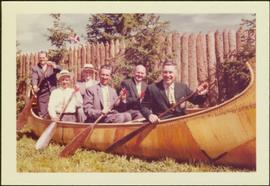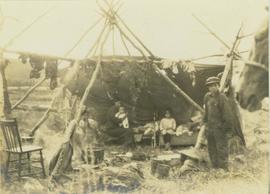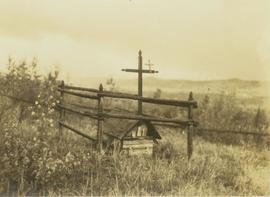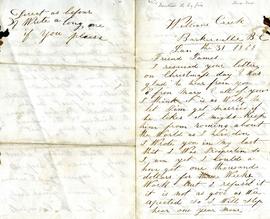File consists of photographs of the construction of ceremonial mace, chairs, and Senate doors for the University of Northern British Columbia.
File consists of 6 videocassettes of the construction of ceremonial mace, chairs, and Senate doors for the University of Northern British Columbia.
Video recording is a compact VHS recording of the construction of the ceremonial mace (Talking Stick) for the University of Northern British Columbia.
Video recording is a compact VHS recording of the construction of the ceremonial chairs (President's Chair and Chancellor's Chair) for the University of Northern British Columbia.
Video recording is a compact VHS recording of a feature for CBC Prince Rupert about the construction of the talking stick and ceremonial chairs (President's Chair and Chancellor's Chair) for the University of Northern British Columbia.
Video recording is a VHS recording of the construction of the Senate chamber doors for the University of Northern British Columbia.
Video recording is a VHS recording of the making of the Ceremonial Chairs and Mace (Talking Stick) for the University of Northern British Columbia.
Video recording is a VHS recording of the making of the Ceremonial Chairs and Mace (Talking Stick) for the University of Northern British Columbia.
Collection consists of 5 yellow cedar carvings by Billy Edmund. The three unpainted carvings are entitled "Raven," "Flying Hawk," and "Raven, Bear, Salmon and Beaver Totem." The final two carvings, both entitled "Salmon," are painted in red, black and teal.
Zonder titelFonds consists of textual records, 24 photographs, 6 video recordings, 4 microcassettes, and 1 floppy disc from the 27-28 March 1998 We're All Here to Stay Delgamuukw forum.
Series consists of different drafts of Chapter 7, "Unlocking the Medicine Chest: The Implications of Transferring Control of Health Services to First Nations," for the book, Prospering Together: The Economic Impact of Aboriginal Settlement in British Columbia, published by the Laurier Institute, as well as other related records. Includes publication "A Statistical Report on the Health of First Nations in British Columbia", Health Canada, 1995.
Consists of 1 edited and revised early draft of chapter for Prospering Together. Initial paper--which was subsequently heavily revised--was written by Lee G. Morrison and David Fish, and was entitled "Land Claims Settlement and the Devolution of Control of Health Services: The Health and Economic Report".
Consists of 1 later draft of chapter for Prospering Together, entitled "Chapter 7: Unlocking the Medicine Chest: the Implications of Transferring Control of Health Services to First Nations." Also includes 1 Laurier Institution brochure entitled "The Challenge of Diversity," and 1 cover letter. Cover letter, from Ann G. Roberts, Executive Assistant, Laurier Institution, asks Dr. David Fish to amend submitted chapter and then approve the final version for publication.
Consists of correspondence, contract, book prospectus, and curriculum vitae of assistant relating to Dr. David Fish's chapter for Prospering Together.
Item is a photograph of Ray Williston and other cabinet ministers paddling a birch bark canoe in the grass during BC Centennial celebrations in Prince George.
Originally mounted on poster with photographs 115.1, 115.2, 115.3.
Series consists of nine photographs of Prince Rupert scenery, buildings, residents and surrounding area. Includes image of totem and dugout canoe.
Item is a print of a photograph of a stone totem pole at Metakatla taken between 1906 and 1908.
Item is a print of a photograph of a person poling a dugout canoe between 1906 and 1908.
Photograph depicts a family consists of a woman and four children standing underneath or next to a lean-to style tent. Meat is drying above the campfire and the head of a horse is visible in the foreground.
Photograph depicts a First Nations family consisting of a woman and four children standing underneath or next to a lean-to style tent. Meat is drying above the campfire and a horse's head is visible in the foreground.
Photograph depicts an unmarked First Nations gravesite featuring two crosses at Moberly Lake.
File consists of documents, a newspaper clippings, and summaries surrounding the surrender of the Cheslatta Reserve on April 21, 1952. Highlights include:
- Chief Marvin Charlie, "The Story of the Surrender of the Cheslatta Reserves on April 21", 1952 (document)
- Mike Robertson (compiler), "Ootsa Lake Settlers: Sale of Land to Alcan, 1950-54", 1991 (draft document)
- Cheslatta Band, "Cheslatta Redevelopment Project Executive Summary", [after 1990] (booklet)
File consists of material collected relating to Indigenous Peoples of British Columbia, predominantly the Gitksan-Carrier people. Consists of information on traplines and land claims. Materials include newspaper clippings, pamphlets, a map, a reproduction of a thesis, a poster, and photocopied articles. Highlights include:
- "The Indian Heritage Series" collectable coins, 1977 (pamphlet)
- Robin Fisher, "Indian Warfare and Two Frontiers: A Comparison of Washington Territory during the Early Years of Settlement", 1980 (photocopied journal article)
- Douglas Ridley Hudson, Masters Thesis, "The Historical Determinants of Carrier Social Organization: A Study of Northwest Athabascan Matriliny", 1972 (reproduction)
- Map of "Band/Reserve Locations in Northern B.C."
- "Northern Times Magazine", Vol. 6, No. 150 (Sept. 1, 181) and Vol. 7, No. 160 (May 23, 1982)
- Jo-Anne Fiske Thesis, "And Then We Prayed Again: Carrier Women, Colonialism and Mission Schools", 1981 (reproduction)
- Yinka Dene Language Institute, "Lest We Forget", [198-?] (poster)
The poster lists the names of World War II Canadian Indigenous soldiers from Cheslatta, Lake Babine, Stoney Creek, Tl'azt'en Nation, Mcleod Lake, Lheit-Lit'en Nation, Stellat'en First Nation, Nak'azdli, Broman Lake, Telkwa, Nadleh Whut'en, Burns Lake, Grassy Plains, and Nazko. This poster was created by the Yinka Dene Language Institute.
File consists of collected newspaper clippings regarding Lejac Residential School, a residential school near Fraser Lake, BC that operated from 1922 to 1976 by the Roman Catholic Church under contract with the Government of Canada.
Collection consists of 1 video recording (VHS) entitled "Uncorrupted : The Story of Rose Prince." The documentary, originally shown on EWTN, asks "Will Rose Prince be British Columbia's First Saint?" Director/Producer Ken Frith travels across British Columbia, Canada on twelve occasions to interview people about Rose Prince. Each journey is recorded as a short travel log showing the environment in which the interviewee lives. In addition, the film records the events taking place at the annual July pilgrimage to her gravesite at Lejac and the fact that miracles are being associated with the use of dirt from Rose's grave.
File consists of digital scans of the following reports regarding indigenous land use:
- Archeo Tech Associates. "An Aboriginal Sustenance Impact Assessment of the Quesnel River Gold Development Project, near Quesnel, B.C.". Prepared for the Mine Review and Permitting Branch, Ministry of Energy, Mines and Petroleum Resources. December 1993.
- Archeo Tech Associates. "An Aboriginal Sustenance Impact Assessment of the Kemess South Gold-Copper Project: A Status Report". Prepared for El Condor Resources Ltd. September 1995.
- John Dewhirst and Archaeo Research Ltd. "Tsilhqot'in Use and Occupancy of the Xeni Gwet'in Claim Area, 1793-1864". Prepared for Chief Roger William, Xeni Gwet'in First Nation Government and Woodward & Company. 4 August 2005.
This 16 page booklet includes illustrations and a program of events, along with a short history of Williams Lake, a short history of stampedes, a "Dude Dictionary", and a poem entitled "The Old Cow Puncher". Also includes a summary about the "Cariboo Indians" (possibly referring to the Secwepemc Nation and other First Nations near the Williams Lake area) contemporary to the time that contains information that is now considered inaccurate.
File consists of documents regarding Joseph Tappage, also known as Sousa Thappage, Joseph Vernon Tapage, Joe Merrienne, or Joseph Thapage. Includes:
- Lynette Harris, "Joseph Tappage: A Case Study of a Metis Employee of the Hudson's Bay Company at Fort George, 1887-1910", 2009
- Robin Fairservice, "An Early South Fort George Pioneer", 2014
This file consists of copies of two manuscript items relating to the history of the Oblates in Northern British Columbia; the third item is a copy of the transcription and translation of one of these accounts. Includes:
- A copy of a type-written unpublished account possibly written c. 1922 entitled "Indian Schools of Fort St. James and Fraser Lake, B.C." The account is written by Father Elphage Allard, OMI on the founding of the residential school at Fort St. James and later of the building of the residential school at Lejac, near Fraser Lake, BC. Allard refers to his, and his younger siblings', also named Father Allard, involvement in the building of the residential schools at Fort St. James in 1916-1917 and subsequently at Fraser Lake ca. 1920-1922. Father Allard provides a detailed account of daily life and spiritual work conducted by the Oblates at the schools including daily routines of the First Nations students, dormitory life, educational curriculum, religious education, and arrival of a group of the Sisters of the Infant Jesus Congregation to assist at the school. The account provides descriptions of the 1918 flu epidemic and deaths that occurred among communities at Fort St. James, Pinchi, Tachi, Fraser Lake and Lake Porteur; involvement of the Anglo-Europeans in the construction of the schools; and interactions with the Chinese cook and Indian Agent in the communities. The manuscript also provides brief account of Allard's journey to provide religious services to other First Nations communities including Fort Graham, McLeod Lake, Atlin and Whitehorse. Both Father Allards were subsequently dismissed from involvement in the Fraser Lake School in 1922.
- A copy of a handwritten account by Father Jean-Marie Lejeune entitled "Comment la Sténographie a été introduite dez les sauvages" written by Lejeune at the Indian Missionary, Kamloops, B.C. c.1890-93 in which he describes his introduction of the shorthand in British Columbia to First Nations in the Kamloops region and the subsequent publication of the newsletter entitled Kamloops Wawa.
- A transcription and translation of Father Lejeune's account by William Poser with annotations.
This file consists of photocopy reproductions of research material relating to the Missionary Oblates of Mary Immaculate (OMI) in Northern British Columbia, the Stuart Lake Mission, and the Our Lady of Good Hope Church in Fort St. James. Includes:
- Informational email from William O'Hara about the Our Lady of Good Hope Church in Fort St. James, 2014
- Reproduction of article by Bill O'Hara, "Our Lady of Good Hope Church first used at Christmas, 1878" from the Caledonia Courier, 17 Dec 1997
- Reproduction of "Missions de la congrégation des missionnaires oblats de Marie Immaculée - Dix-huitieme Année - No. 69. - Mars 1880" [French], a report that includes mention of "les Babines", "les Sékénés" [Sekani], "les Hotsoten" [Wet'suwet'en], Stuart Lake, Fort George, McLeod Lake, Babine Lake, among others
This file consists of photocopy reproductions of three oral history tape transcriptions of interviews with Father Pierre Poullet of the Missionary Oblates of Mary Immaculate (OMI). Poullet was active in missionary work in northern BC between 1937 and [1998?] ; these transcripts mention Lower Post, Telegraph Creek, Dease Lake, McDame, Fort Nelson, Muncho Lake, and the Alaska Highway. The transcripts are titled "Earlier tape", "Tape of Lower Post", and "Tape of Fort Nelson".
Item consists of a letter written by John McCormick to a person named James; it is not made clear if James is a friend or relative. In both his letter to James, John McCormick makes several references to Victoria. His familiarity with Victoria suggests that he may have travelled from Victoria to Barkerville to mine for gold. In his letters to James, John McCormick describes having no money and living under poor conditions. He mentions the great fire that swept through Barkerville and that he lost nothing due to its distance from his house. McCormick also mentions that the Indians are dying quickly of Small Pox in Victoria.
Fonds consists of the personal records of Nedra (Ginty) Jane Paul [b. ca.1920-d. 1990]. Personal records include the 1938 Lord Byng High School Annual, 2 teaching certificates, and 1 photograph. Paul worked as a teacher in the Chilcotin and Bella Coola regions of BC and the primary items of the collection are 8 recordings generated by her with members of First Nations Communities at Alkali, Red Stone, Kleena Kleene and Bella Coola from 1964-1971. There are 8 original audio reel to reel recordings (and 2 tapes which are copies of the recordings later created by P.J. Thomas, who accompanied Paul on the interviews). Recordings include stories and songs.
Zonder titelSeries contains audio recordings taken by Nedra (Ginty) Jane Paul of stories and songs from First Nations people and other residents of Northern BC.
Consists of an audio recording of George Meyers singing Redstone songs, recorded by Paul.
Consists of an audio recording of George Meyers singing Redstone songs.
Consists of an audio recording of Mr. and Mrs. E.L. Henry and of Henry Sill in the Ulgatcho dialect (Carrier language) and the Bella Coola/Nuxálk dialect (Salishan language). [unconfirmed]
Consists of an audio recording made by Paul of Mr. Sammy counting to 10, Mrs. Sammy singing two songs, Mr. S. Lahal, and Mrs. T. Lulua.
Consists of an audio recording made by Paul of songs sung by Mrs. Danny William, Mrs. E. Sammy, Mrs. Peter William, and Mrs. Patrick Andy.
Consists of an audio recording made by Paul of Joseph Jeff, Old Ekks' son-in-law, asking questions of Old Ekks at Redstone.
Consists of copies of audio recordings made by Ginty Paul.
Consists of copies of audio recordings made by Ginty Paul.
Collection consists of oral histories gathered as part of Dr. Mike Evan's oral history project with the Prince George Metis Elders Society. Includes consent forms, transcripts, and the recorded oral histories on their original cassette tapes.
Zonder titelFile consists of an oral history given by Florence Aubichon, which was gathered as part of Dr. Mike Evan's oral history project with the Prince George Metis Elders Society. Includes consent forms and a transcripts.
File consists of an oral history given by Anna Bellrose, which was gathered as part of Dr. Mike Evan's oral history project with the Prince George Metis Elders Society. Includes consent forms, transcripts, and the recorded oral history on the original cassette.
File consists of an oral history given by Rose Bortolon, which was gathered as part of Dr. Mike Evan's oral history project with the Prince George Metis Elders Society. Includes consent forms, transcripts, and the recorded oral history on the original cassette.
File consists of an oral history given by Antonia Brommeland, which was gathered as part of Dr. Mike Evan's oral history project with the Prince George Metis Elders Society. Includes consent forms, transcripts, and the recorded oral history on the original cassette.
File consists of an oral history given by Frances and John Cunningham, which was gathered as part of Dr. Mike Evan's oral history project with the Prince George Metis Elders Society. Includes consent forms, transcripts, and the recorded oral history on the original cassette.
File consists of an oral history given by Jerline Doucette, which was gathered as part of Dr. Mike Evan's oral history project with the Prince George Metis Elders Society. Includes consent forms, transcripts, and the recorded oral history on the original cassette.




